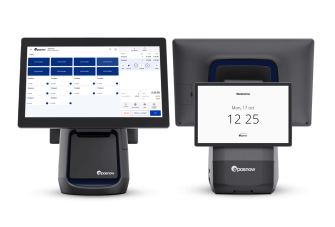How to Accept Credit Card Payments
More and more Brits are joining the cashless society. In fact, according to UK Finance, in the decade between 2012 and 2022, payments made with cash fell from 54% to just 14%.
Because of this, it's really important for your company to offer its customers lots of different ways to pay for your products or services, depending on the methods your customers prefer. One of these methods is credit card payments.
How do you accept credit card payments, you ask? Let’s answer this question together. We'll give you the lowdown on how credit card processing works, how to accept payments via a credit card (including how to accept online payments), and share some intel on if it's safe to do so.
Accepting credit card payments for businesses
Here's an overview on accepting credit card payments. In this section we're dishing out the details of all the ways you can.
Store card payments
If you want to accept credit card payments in a retail or hospitality venue (we're talking restaurants, hotels, boutiques and salons) you'll need a point-of-sale (POS) system (this can be either a retail POS or hospitality POS) with a credit card terminal or card readers to process those transactions.
Modern POS systems like Epos Now's all-in-one solution include POS hardware and POS software that allow you to process both payments made with credit and debit cards and cash transactions.
If needed, customers can also usually enter a personal identification number (PIN) for debit card payments or jot down their signature to authorise the transaction onscreen or via a receipt printed on the credit card terminal.
Mobile card payment options
If you're looking to complement your in-store credit card payments, you may also consider accepting mobile credit card payments. This'll make your company a lot more flexible and some customers favour this method of payment.
Mobile payments allow you to accept physical cards anywhere with no other equipment than your mobile phone or a mobile card reader. These mobile solutions are usually lightweight and great for sales made on the go, like at trade shows, pop-ups, art fairs and farmers markets.
Epos Now is a great mobile credit card payment processor. Its mobile card terminal, the Air, lets small business owners take payments from their pockets with a portable, lightweight, and practical solution. You'll be able to accept all major credit card payments including Visa, MasterCard, American Express, and UnionPay. Payments can also be made via eWallets (like Apple Pay, Google Pay, and Samsung Pay) for the same rate.
Accepting credit card payments online
To accept payments online, if you have an e-commerce business for example, you'll need an account with a payment service provider (PSP), such as Shopify.
To do this, connect it to your online store. This is pretty simple with the right online website builder. Many website builders, such as Epos Now Online and Shopify, and marketplaces, such as Etsy, are designed to facilitate online payments and they also integrate seamlessly with a payment processor.
To accept payments online for your dropshipping business, you'll need an account with a payment service provider (PSP) that supports dropshipping transactions, such as Shopify.
Now, while a lot of website builders come with a secure sockets layer (SSL) certificate to make sure that your customer’s security is considered, you may have to use a standalone service to accept card payments online.
If your current website doesn’t play well with payment providers, you can link out to your account with a “pay now” button on your website and allow customers the opportunity to pay through third-party sites. This is a little less seamless though and could require a lot more manual work on your end.
Behind credit card processing
Ever wondered what happens when someone swipes a credit card at your business? Let’s break it down together, shall we?
Merchant account
First, you need a merchant account. Think of it as a special bank account for your business. It temporarily holds funds from credit card sales before they go into your actual bank account. Getting a merchant account usually involves an application process and approval, but it’s worth it for the extra features and control it offers.
Payment service provider
Another option is to use Payment Service Providers (PSP). These companies make it super easy to accept credit card payments without needing a separate merchant account. They'll handle all the complex stuff and deposit money directly into your bank account. It’s quick and hassle-free.
Support your card processing with the right point of sale equipment
To make the most of your credit card processing, you're going to need the right Point of Sale (POS) equipment. Here's the 411 on everything POS.
POS hardware
First, you'll need reliable POS hardware. We're talking card readers, cash registers, barcode scanners, receipt printers, and more. Many modern, techy card readers can handle chip, swipe, and contactless payments, giving your customers flexibility. Choose POS hardware that’s robust, easy to use, and also integrates well with your payment system.
POS software
Next, there’s POS software. This is the brain behind your POS hardware. Good POS software helps manage sales, inventory, and customer data. It also guarantees that all of your customer's transactions are super secure and go through smoothly. You'll need to check out POS software that’s user-friendly and offers features that fit your business needs, like sales tracking, reporting, and customer management.
Payment processing services made simple
Take payments with our integrated payment solutions with no hidden fees - anytime, anywhere!
Credit card processing fees for your business
Here are some of the credit card processing fees you may have to pay as a business owner who accepts credit card payments.
- Interchange rate: This is the percentage of the sale that goes straight to Visa, Mastercard, Amex or whatever credit card company used. The rates for this fee vary, but they'll be anywhere from 1.5% - 3.5% for traditional card payment companies and sometimes more for your premium credit cards.
- Transaction fee: This is the cut that you, the company owner, pays to the payment service provider or the payments processor. You'll pay this on top of your interchange rate. Now, some payment processors just charge one flat rate for a transaction made with a credit card. This'll usually cover their cut plus the interchange rate. Others use an interchange-plus model which charges you the interchange rate and their own fee.
- Service fee: Sometimes, depending on the provider you go for, you might also have to pay a subscription fee (these are monthly fees or annual fees for services). A lot of small business PSPs don't put this fee on though, and they tend to only charge a flat-rate transaction fee.
Are card payments safe?
Absolutely, they are! But, only if they're done the right way. To handle credit card payments safely, you absolutely must follow PCI compliance standards that help protect your customer's data. Luckily, Epos Now Payments, our payment processing service, meets these standards. So, you can save time and money from making those extra validation steps.
While credit card processing costs are a worry to small business owners, offering your customer's more payment method choices can boost your sales, offsetting fees. Make sure to look into how these credit card fees could impact your overall business profits and then look for ways to balance them.
(FAQ): All about credit card payments for small businesses
- Can my business take credit card payments?
-
Absolutely! Almost any business can take credit card payments. You just need to set up with a payment processor or get a merchant account. Once you're set up, you can start accepting credit card payments in no time.
- How much do card machines cost?
-
If you decide to buy your card machine outright, there's a lot of different types to choose from that can fit your needs.Mobile point of service (mPOS) card readers from payment facilitators like Epos Now that work with a mobile app cost around £19 per month. Read our full guide to learn more about how much does a card machine cost.
- Do I need a business account to accept credit card payments?
-
No, you don't need a business bank account to accept credit card payments. A lot of payment processors let you use a personal account. However, having a business account can definitely offer you more features and better management tools. It's generally recommended for businesses to separate their personal and their business finances. This helps with accounting and tax purposes.
- How to set up card payments for business?
-
Setting up card payments for your business is really easy. First, choose a payment processor like Epos Now Payments. Then sign up and link your business bank account to receive funds. Next, integrate the payment gateway with your website or POS system. Test the system to ensure everything works and you're now ready to accept credit card payments!



